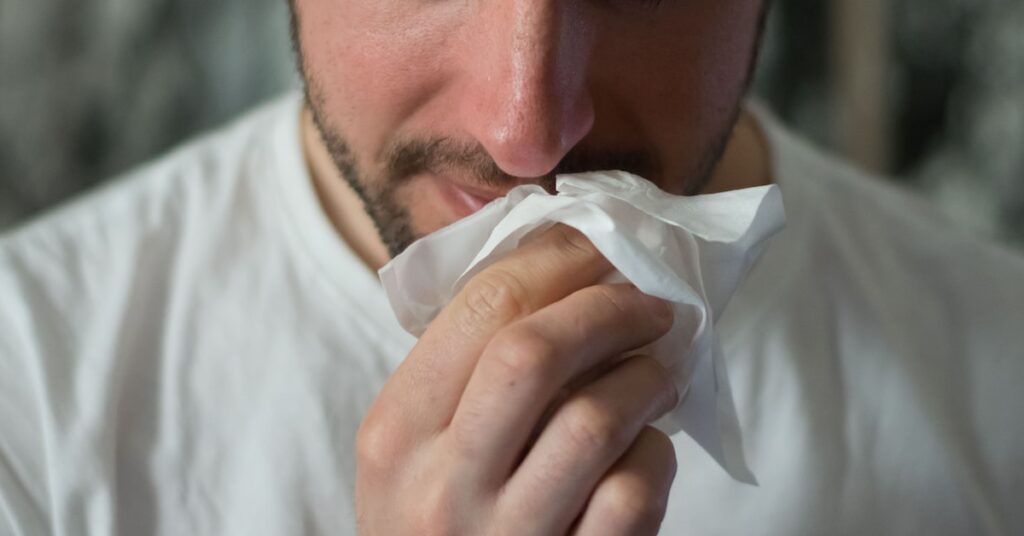

You can scuba dive with a mild cough, but most symptoms that accompany a cough disqualify you from swimming. It’s important to do a full assessment of your health before starting a dive to make sure you are in the right condition all around.
Knowing the difference between an insignificant cough and full-on sickness is essential, and we’ll explain some of the symptoms that can bar you from scuba diving.
Can You Scuba Dive While Sick?
In most instances, you should not and do not want to scuba dive when you are sick. Even if you’ve been planning a dive for a while, scuba diving when you are sick increases your risk in many areas.
This doesn’t mean that some mild or moderate symptoms, such as those linked to allergies, are going to take you out completely.
Keep in mind that most illnesses pass quickly, and it’s not worth the chance of:
- Diving with impaired lung or cognitive function
- Being too weak to get around in the water
- Running out of energy much quicker than you would while healthy
In many cases, the conditions of scuba diving will make you feel much worse than when you started, and you can end up delaying the healing process, even if you don’t injure yourself while diving.
Signs You Are Too Sick to Dive
While an occasional cough might be manageable, symptoms that mark you as too sick to dive include:
- Persistent coughing
- Rattling
- Sneezing
- Fever
- Bad sore through
- Struggling to swallow
A cough here and there won’t interrupt scuba diving by much, but when it’s happening non-stop you run a higher risk of losing your regulator and wasting your air.
Often, these symptoms come along with a sped up metabolism that burns through energy quickly and will tear through your air consumption. Sneezing messes with the seal around your mask, and you can end up trying to clear mucus from your lenses.
Issues with your nose and throat also inhibit your ability to equalize properly. This is dangerous already, but it further aggravates certain symptoms you may have.
Can You Dive with Chest Congestion?
You should not dive with any chest congestion. This extra mucus in your lungs makes it harder to breathe, and increases the stress on your body. You go through your air faster, but you also burn up any energy you had for your dive.
Chest congestion also increases your risk for a potentially fatal arterial gas embolism (AGE) if the air was trapped behind the music in your lungs.
Scuba Diving Safe Medication for Allergies
There are certain instances when you can manage your symptoms with medication. While you should avoid anything that makes you drowsy, many divers have success with managing allergies and diving.
You need to have experience with the medication before diving on it, and you should always check with your doctor beforehand. It’s also important to recognize that this is only for mild cases, including some seasonal allergies, and medication is not a solution for those who are too sick to scuba.
The list of generally approved medication include:
- Sudafed
- Dimetapp
- Afrin
- Flonase
- Claritin
You want to choose a long-lasting 12 hour formula to make sure you have enough time for it to kick in and give yourself about 2 hours out of the water before it wears off.
Certain medications, like Sudafed, are known to increase your heart rate, so they may not work well for those with anxiety.
If you’re only dealing with sinus inflammation, Flonase (which is only available through prescription) can be used up to twice a day a few days in a row without worrying about worsening your symptoms.
Can I Scuba Dive with Bronchitis?
You should not dive with bronchitis. This inflammation of the lining of your bronchial tubes increases your chance of trapping air in your lungs and is likely to result in a lung expansion injury.
Bronchitis is also accompanied by other risky symptoms, including:
- Clogged airways
- Coughing
- Head congestions
- Bronchospasms
- Shortness of breath
Besides the risk to your health, diving with bronchitis would be miserable at best. You probably would not be able to fully enjoy your dive as you’re dealing with your health and worried about everything that could go wrong.
It’s better to wait until you’re clear of bronchitis and feeling much better to dive.
Can Asthmatics Dive?
Asthmatics can dive, which may be news to some. In the past, most people with asthma were automatically prohibited from diving due to the risks of triggering airways inflammation.
The thought process here was that diving exposed asthmatics to possible triggers for asthma attacks, including:
- Cold, dry air
- Physical exertion
- Salt water
The actual evidence linking these claims just isn’t there, but people are still urged to understand their own triggers before taking the risk.
While diving with asthma may pose a higher risk, most people who do it understand their bodies and have contingency plans in place.
References
https://www.scubadiving.com/diving-cold
https://dtmag.com/thelibrary/waiting-to-exhale-divings-golden-rule-explained/
https://scubaboard.com/community/threads/diving-and-bronchitis.433411/
https://www.healthline.com/health/asthma/scuba-diving-with-asthma
